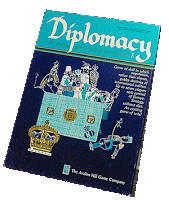One of our standard go-to games when I was in high school was Avalon Hill’s Diplomacy. This is a game that has very deep roots in both the wargaming and RPG community, as one of the few ways back in the 1960’s and 1970’s that gamers had to communicate with one another en masse was in the context of newsletters centered around the game.
One of the unique things about Diplomacy is the ease with which it can be played by mail (or email, nowadays). That’s not to say it’s not a terrific (if somewhat long) game to play across a tabletop, but PBM Diplomacy was a staple for many gamers back in the hoary mists of antiquity. In fact, Gary Gygax was a contributor to several such diplomacy ‘zines, and some of the earliest non-TSR D&D articles (or mentions) are to be found in such places, such as his Expedition to the Black Reservoir (published in El Conquistator in 1975) and Len Lakofka’s own Diplomacy ‘zine Liaisons Dangereuses, which lasted from 1969 to 1977.
The game portrays the power politics in Europe at the start of the 20th century. Seven powers– England, France, Italy, Germany, Austria-Hungary, Russia, and Turkey– are vying for dominance. Players have armies and fleets, and write down movement orders, which are then revealed simultaneously. Combat occurs if units from different nations attempt to occupy the same territory, in a very simple system. Basically, if you have more units supporting your move, you get to occupy the territory. Units are only destroyed if they can’t retreat or if a country doesn’t have enough supply territories to support them all.
Where Diplomacy really shines, though, is in the behind-the-scenes negotiation between the players. If you promise to move your fleet out of Marsailles, I’ll give you the supply center in Portugal, so we can stop Turkey from moving his fleet into the central Mediterranean… etc. etc. etc. The joy comes from making complicated deals like that and then back-stabbing your would-be ally in order to grab all the supply centers for yourself.
It’s a remarkably well-balanced game (although some claim that the two “Wicked Witches”, England and Turkey, do better than others such as Italy or Austria-Hungary) and the mechanics are so easy that they can be taught in 5 minutes. I’ve heard complaints that it’s too long a game (4+ hours), but that can be alleviated by simply clamping down on the amount of time players can spend on diplomacy between turns. And besides, when you have a game like this that not only encourages, but requires, players to interact with one another, the day becomes less about the game itself and more about the time you’re spending with friends.
And that’s one of the reasons it’s one of the games I love.










Couldn't agree more. Getting a home-made zine with Diplomacy and Railway Rivals turns and some articles written purely for a love of the subject made me feel part of a community, not just some geek who played a weird game that you couldn't win.
What a great post! A superb game – you've brought back some happy memories!
Think I've got a copy of the new version of the game stuffed in the back of the closet . . .
Never actually played the darn thing, though.
There's a pretty strong online Diplomacy community. For a while back in the late '90s seemed to center around http://www.diplom.org/index.py (and before then usenet newsgroups) which looks to still be going strong.
For anyone looking for an online play-by-email game (typically orders anywhere from daily to weekly) that would be a good place to start.
+1. I fondly remember turning my roommate (Austria) into a client state while his armies attacked Russia. The pained look on his face when I took all of his population centers was priceless.
This is one of the few games I think isbetter when played by email, snail mail, or the like. In High School, we'd play 2 turns per day at lunch (one at the beginning and one at the end of lunch). The rest of the day was spent running around with a copy of the map, neogtiating with other players as you ran into them in classes. Great fun! The back-stabbing was awesome!
It's funny, but the comments from other people actually highlight why I never cared for the game. I could never manage to enjoy the betrayal/back-stabbing/pained looks after a game.
What can I say? I'm a softie. 🙂